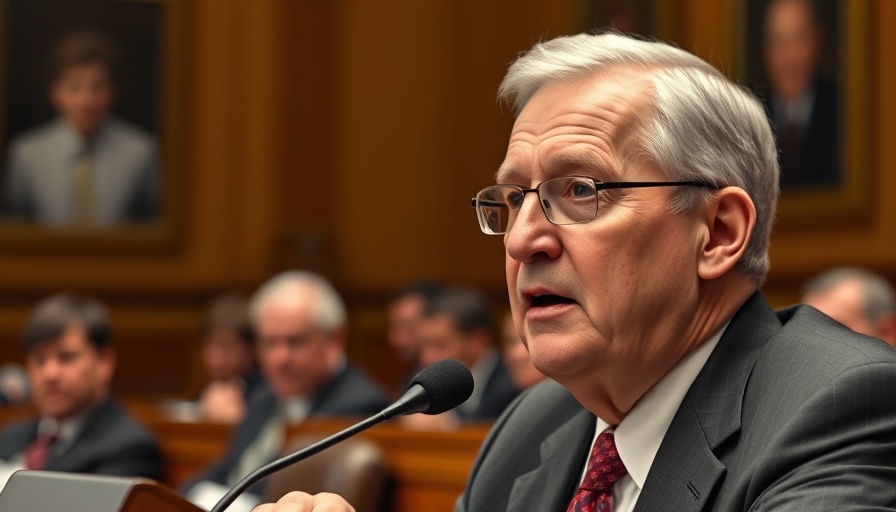
The Complexity of Sanctions: Context and Background
The recent sanctions imposed by the United States on a Palestinian non-governmental organization (NGO) and five associated charities highlight a growing tension around alleged connections to terrorism. This action has far-reaching implications not just within the political landscape of the Middle East, but also in how global powers engage with complex humanitarian issues.
In 'US imposes sanctions on Palestinian NGO and five charities over alleged terrorism funding', the discussion dives into the complexities of US actions and their humanitarian ramifications, prompting a deeper exploration of these critical issues.
Understanding the historical context is essential. The Israeli-Palestinian conflict has been marked by cycles of violence, political strife, and allegations of misconduct on both sides. NGOs operating in this environment often navigate a tightrope between providing essential humanitarian aid and the realities of geopolitical accusations. In this particular case, the U.S. government cites links to terrorist activities as the rationale for these sanctions, which raises questions about efficacy and the potential humanitarian impact.
The Impact on Humanitarian Aid and Civil Society
Restrictive measures, such as those recently implemented, have a dual impact. While they aim to curb funding to entities deemed culpable of terrorism, they inadvertently hinder the provision of aid to vulnerable populations reliant on these charities. The sanctions against these organizations not only affect operational capabilities but could also stifle the voices of civil society that critical engage in advocacy and support.
Professionals working within humanitarian frameworks often express concern that such actions may disincentivize organizations from operating in conflict zones, ultimately depriving civilians of needed support. This complex balance between security and humanitarian needs poses a significant question: How can aid be sustained while addressing legitimate security concerns?
Diverse Perspectives on the Sanctioning Effect
Those in favor of the sanctions argue they are necessary to uphold international security measures. Supporters claim that failing to address suspected terrorism funding would undermine international efforts to combat extremist groups. On the other hand, critics—including advocacy groups and some foreign policy analysts—contend that the broad application of sanctions can lead to collateral damage, primarily impacting innocent civilians rather than intended targets.
This divergence of thought underscores the need for responsible governance and transparent accountability in such measures, allowing for dialogue that encompasses different viewpoints. The balancing act between national security and humanitarian principles is fraught with risk and ambiguity.
Future Predictions: The Trend of Sanctions in Global Politics
As geopolitical tensions continue to evolve, sanctions are likely to remain a favored tool among powerful nations, including the U.S. However, the increasing complexity of global interdependencies prompts a critical view of their long-term effectiveness. Will these measures deter the activities they aim to disrupt, or will they merely sow seeds for further conflict?
In such uncertain political landscapes, professionals must anticipate how ongoing relationships and aid frameworks will adapt. Emerging trends suggest a growing emphasis on multilateral approaches to sanctions and accountability that balance security with humanitarian considerations.
The Role of Civil Society and Global Governance
The recent sanctions spotlight the essential role played by civil society organizations in advocating for peace and humanitarian aid. These entities often serve as a bridge between distressed populations and governmental entities. Their involvement in conflict resolution cannot be understated.
As governmental actions come under scrutiny, there arises an urgent need to empower civil society voices, fostering an environment conducive to collaboration rather than obstruction. International organisms like the African Union and various global NGOs are uniquely positioned to mediate and propose solutions that consider both security and humanitarian concerns.
Conclusion: Navigating the Future with Awareness
As professionals and interested stakeholders navigate the intricate landscape of international relations and sanctions, remaining informed and engaged is crucial. Understanding the effects of these sanctions and advocating for more nuanced policies that prioritize humanitarian needs is essential for progress. In this context, it becomes imperative to explore the implications of U.S. sanctions on Palestinian NGOs and what they signify for future humanitarian endeavors.
 Add Row
Add Row  Add
Add 




Write A Comment